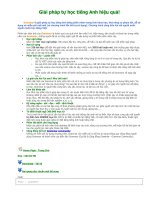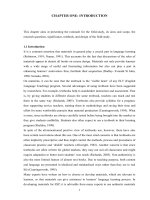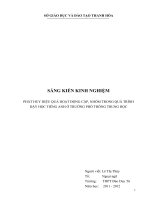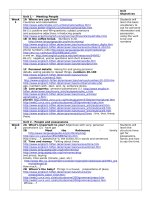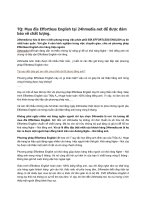chương trình tự học tiếng anh
Bạn đang xem bản rút gọn của tài liệu. Xem và tải ngay bản đầy đủ của tài liệu tại đây (82.82 KB, 4 trang )
Unit Objectives
Unit 1 - Meeting People
Week 1 1A Where are you from? Greetings
Countries and nationalities
/> />Be (1): positive and Wh-questions; subject pronouns
and possessive adjectives; introducing people
/>1B In the coffee break, Numbers 0-20;
/> /> />phone numbers; jobs
a and an. />Be (2): negative, yes/no questions and short answers.
/> />1C Personal details: Asking for and giving personal
details, asking people to repeat things, numbers 20-100
/> /> />age, numbers with –teen and –ty; sentence stress
1D Lost property: personal possessions (1) lisch-
hilfen.de/en/exercises/nouns_articles/apostrophe_s.htm
plurals /> />
/>
; this, that, these,
those.
Students will
learn the basic
vocabulary to ask
for personal
information and
possession, using
the verb to be
and numbers
Unit 2 - People and possessions
Week 2 2A What’s important to you? Adjectives with very; personal
possessions (2); have got
2B Meet the Robinsons – family guageguide.org/im/family/eng/
/>How many….?; possessive ‘s; the schwa /∂/ in words and sentences
2C Time and money Talking about times
/> /> /> />and prices; buying
tickets, time words (minute, year, etc.)
/>llenge16/
How much….?
2D Where’s the baby? Things in a house; prepositions of place
lisch-
hilfen.de/en/exercises/structures/prepositions_place_time.htm;
/> /> Whose….?
Students will
learn the
structure have
got for
possessions,
family and how to
say the time.
Unit 3 Daily life
Week
3
3A A glamorous life? Daily routines; present simple (1) positive
and Wh- questions (I/you/we/they)
/>3B Evenings and weekends: Free time activities (1) time
phrases with on, in, at, every
Present Simple (2): negative and yes/no questions (I/you/we/they)
330 Grammar: Negatives and Questions in the Simple Present Tense
Questions with do you… ?
3C Special Days: phrases for special days; suggestions
Students will
know about the
present simple
and the
difference
between subject
and object
pronouns.
Segundo Nivel
Unit 1 - Work, rest and play Unit Objectives
Week 1 1A Life Stories day-to-day phrases, question words; review of verb forms and
questions
/> /> /> />1B Super commuters: work; questions about travel; subject
questions, word stress
1C Time to relax: free time activities; do, play, go, go to;
frequency adverbs and expressions; Reading: The British way of
life?; Listening: A free time survey, sentence stress (1)
1D Speed dating: Finding things in common
Students will
review the verb
forms and
questions
Unit 2 - People and possessions
Week 2 2A Starting small: irregular verbs; past time phrases; Past
Simple
2B First Meetings: relationships (1); Past Continuous: positive, negative and
questions
/>lisch-
hilfen.de/en/exercises/tenses/simple_past_progressive.htm
lisch-
hilfen.de/en/exercises/tenses/simple_past_progressive2.htm,
weak forms (1): was were
2C The 1001 Nights: connecting words (1); Reading: 1001 Nights; Reading and
Listening: Shahrazad’s story; weak forms (2): the schwa /∂/
2D Small talk Starting and ending conversations
Students will
learn to contrast
the simple past
and past
continuous
Unit 3 The world of work
Week
3
3A Getting qualified employment; have to/had to; have to and have
/>hallenge18/
3B Job-Hunting: Looking for a job; Present Continuous and Present Simple
lisch-
hilfen.de/en/exercises/tenses/simple_present_progressive.htm;
/>activity and state verbs.
/>3C Strange jobs: word building; noun endings; Listening: Strange jobs; Reading:
A knife-thrower’s assistant; linking (1): consonant-vowel
3D I’m really sorry! Apologies, reasons and promises
Students will
learn the use of
have to and had
to and review the
present
continuous vs.
present simple.
Unit 4 That’s entertainment!
Week 4 4A The silver screen: types of film; past participles; Present Perfect for life
experiences (1): positive and negative
/> /> />lisch-
hilfen.de/en/exercises/tenses/present_perfect_statements.htm
/> />4B The rhythm of life: music; Present Perfect for life experiences (2);
questions with ever; linking (2); /w/ sounds
4C TV or not TV: TV nouns and verbs; -ed and –ing adjectives
;
/>allenge3/ Listening: Are you a telly addict?; Reading: Kill your TV!; linking (3):
/r/ and /j/ sounds
4D What do you think?: agreeing, disagreeing and asking for opinions.
Students will
learn to use the
present perfect
for life
experiences.
Unit 5 Into the future
Week 5 5A Man or Machine: verb-noun collocations (1); will for prediction; might, will
be able to, ‘ll and won’t
5B Never too old: verb-noun collocations (2); future plans
/>Students will
learn the
different forms to
express the future

